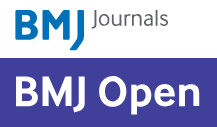Abstract
Introduction: Musculoskeletal disorders and cognitive diseases are prevalent, and they are significant determinants of morbidity and mortality in older adults. The aim of this study is to investigate the prevalence of musculoskeletal and cognitive diseases and their risk factors and also to assess their associations during future follow-ups.
Methods and analysis: Bushehr Elderly Health (BEH) programme is a population-based prospective cohort study being conducted in Bushehr, a southern province of Iran. A total of 3000 older people aged ≥60 years participated in the first stage from which 2772 were eligible to participate in the second stage, which started after 2.5 years. Data including demographic status, lifestyle factors, general healthandmedical history, and mentalandfunctional health are collected through a questionnaire. Anthropometric measures, performance testsandmuscle strength, blood pressure and and body composition measurements are done. A total 25 cc venous blood is taken, and sera are stored at -80°C for possible future analyses.
Ethics and dissemination: The study protocol was approved by the ethics committee of Endocrinology and Metabolism Research Institute, affiliated to Tehran University of Medical Science as well as the Research Ethics Committee of Bushehr University of Medical Sciences. A written informed consent was signed by all the participants. The study findings will show the prevalence of musculoskeletal disease, cognitive impairment and their risk factors in an elderly population. The participants will be followed during the study to measure the occurrence outcomes.This study will also have the potential to inform the development of beneficial interventions to improve the management of musculoskeletal and cognitive impairment in Iran and other countries in the Middle East.Our findings will be disseminated via scientific publication as well as presentation to stakeholders, including the patients, clinicians, the public and policymakers, via appropriate avenues.
Keywords: cognitive function; elderly; musculoskeletal system; protocol.
How to Cite
- Eghtesad S, Mohammadi Z, Shayanrad A, Faramarzi E, Joukar F, Hamzeh B, Farjam M, Zare Sakhvidi MJ, Miri-Monjar M, Moosazadeh M, Hakimi H, Rahimi Kazerooni S, Cheraghian B, Ahmadi A, Nejatizadeh A, Mohebbi I, Pourfarzi F, Roozafzai F, Motamed-Gorji N, Montazeri SA, Masoudi S, Amin-Esmaeili M, Danaie N, Mirhafez SR, Hashemi H, Poustchi H, Malekzadeh R. The PERSIAN Cohort: Providing the Evidence Needed for Healthcare Reform. Arch Iran Med. 2017 Nov 1;20(11):691-695. PMID: 29480734.

